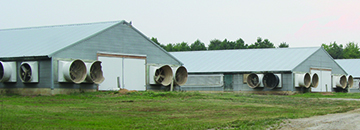By Linda Cicoira — Water withdrawal permits being contemplated by the State Water Control Board for 49 poultry farms in Accomack County were discussed at three public hearings this week and important issues were raised by both sides of the controversy.
Residents who fear their wells might run dry due to excessive use by the chicken growers cited problems with mitigation clauses that would end in civil lawsuits, not governmental intervention if their wells stopped working. They wanted potable water delivered for themselves and their livestock and pets sooner than the 72 hours that was listed. They complained that the board and the Department of Environmental Quality should notify by mail those landowners who could be adversely affected.
“It seems to me (to be) common sense and common courtesy,” said Sarah Nock, of Accomac, when referring to mailings.
Roberta Kellam, a former water board member and a lawyer, said there is an environmental justice issue involved since much of the population is considered below the poverty level or are minorities and may not read the newspaper or know about the proposed permits or consent orders.
“They don’t read English very well,” she said. “There are a lot of reasons why they might not be notified.” Kellam said the mitigation “is a very complex issue especially in light of the justice issue.” She wanted a “more workable” plan.
Mark McCready, a chicken grower, said he wants owners of the 300 residences being planned near his farm in southern Accomack County to be held accountable and be under the same regulations and monitoring he has endured in case their usage interferes with his business.
“I’d like to see these folks get some skin in the game,” said McCready. “We need to let these folks go through the same process I’m going through. Let them record like I have to do. Farmers, we’re basically 2% of the population … every one of you ate three meals today. You ought to be thanking the local farmers. We’re feeding the world. Not the Russians or the Chinese. We are feeding the world.”
He further complained there aren’t any farmers on the water board. “I would like to see some movement on these housing developments. We need to find out what’s truly going on,” McCready added.
Nick Thomas said his Atlantic farm has been in the family for more than 100 years and he’s lived on the Shore all his life. “Permitting amounts are not the actual withdrawals.” Thomas said the amount of water being used is between 70% and 80% of the permitted figure. “That seemed to be the norm” for all growers, Thomas said, adding, the poultry houses are built better than ever before and conserve.
Sue Mastyl, of Harborton, spoke as a board member of the Virginia Eastern Shore Clean Water Council. Two identical 12-house operations were built side-by-side in Pungoteague but they have different withdrawal limit amounts. The figures are 19.4. million gallons for facility number 28 and 11.3. million gallons for number 32. “Let me reiterate, these are identical facilities and there is no expectation that they will be operated differently.”
She said different methods were used to calculate withdrawals. “I have to say this makes me really question the overall estimate DEQ has provided … and I can’t tell at this point whether it is too high or too low. I haven’t taken the time to examine all 49 permits, it isn’t my job, but I suggest that someone does, to make sure these calculations are consistent … because these are 15-year permits, and the allocations assigned … won’t be available for any other user that might need them, and will also prevent us from having an accurate picture of the total impact to our sole-source aquifer.”
Tony Picardi, an engineer from Belle Haven, wondered why the growers aren’t required to use the Columbia aquifer, which replenishes at a much faster rate than the Yorktown aquifer. “There is no risk analysis in these reports,” Picardi said. “At MIT it would have been thrown out. Those simulations need to be done. Let’s put some scenarios on there” for extreme conditions. “This notion that the people in the impact area are not notified is unacceptable … Could possibly we become a Flint Michigan?”
Miriam Riggs, of Cashville, said she is concerned that many of the circles that represent the poultry facilities overlap. In those areas, “people are at ground zero for losing their groundwater.” She said the Melfa area, in particular, could have a problem. Are the growers “ready to answer to 50 landowners when their wells run dry? I’m a visual person. It just looks like a great big mess up there … I’m not down on farming in the least. I’m concerned about the county and state … over permitting these massive groundwater withdrawals. Maybe we need to revisit it … It creates land-use limitations.”
The control board is expected to act on the permits in September.



